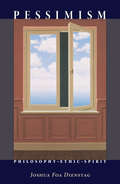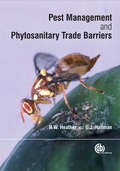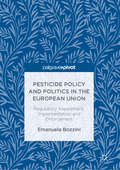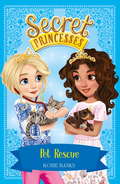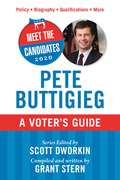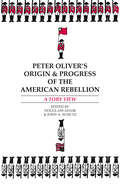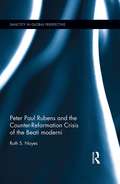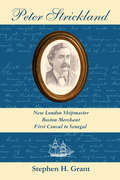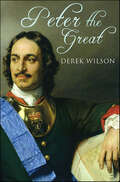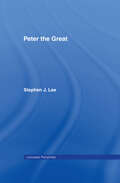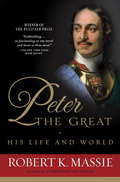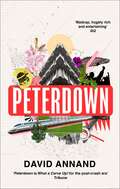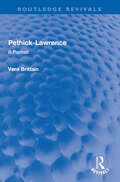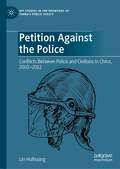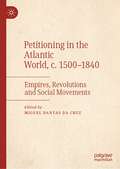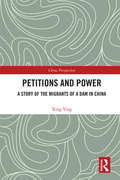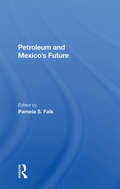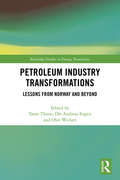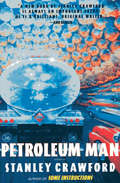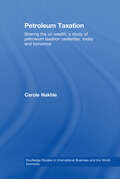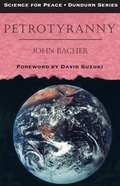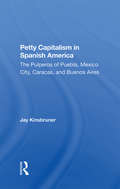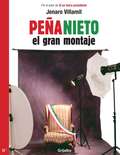- Table View
- List View
Pessimism: Philosophy, Ethic, Spirit
by Joshua Foa DienstagPessimism claims an impressive following--from Rousseau, Schopenhauer, and Nietzsche, to Freud, Camus, and Foucault. Yet "pessimist" remains a term of abuse--an accusation of a bad attitude--or the diagnosis of an unhappy psychological state. Pessimism is thought of as an exclusively negative stance that inevitably leads to resignation or despair. Even when pessimism looks like utter truth, we are told that it makes the worst of a bad situation. Bad for the individual, worse for the species--who would actually counsel pessimism? Joshua Foa Dienstag does. In Pessimism, he challenges the received wisdom about pessimism, arguing that there is an unrecognized yet coherent and vibrant pessimistic philosophical tradition. More than that, he argues that pessimistic thought may provide a critically needed alternative to the increasingly untenable progressivist ideas that have dominated thinking about politics throughout the modern period. Laying out powerful grounds for pessimism's claim that progress is not an enduring feature of human history, Dienstag argues that political theory must begin from this predicament. He persuasively shows that pessimism has been--and can again be--an energizing and even liberating philosophy, an ethic of radical possibility and not just a criticism of faith. The goal--of both the pessimistic spirit and of this fascinating account of pessimism--is not to depress us, but to edify us about our condition and to fortify us for life in a disordered and disenchanted universe.
Pest Management and Phytosanitary Trade Barriers
by Neil W. Heather Guy J. HallmanA significant amount of the world's economy is based upon the international trade of agricultural produce. For the producing countries, a growing concern is the potential economic and ecological damage that invasive species could cause. While threats can be decreased through the regulation of items potentially carrying invasive species, the effect of such restrictions on international trade also needs to be considered. A balance must therefore be met that permits the transfer of produce while filtering out unwanted pests. Drawing on the author's extensive experience, the social and financial implications of phytosanitary trade barriers are reviewed. This book offers valuable and comprehensive coverage of pest related barriers and strategies for their implementation.
Pesticide Policy and Politics in the European Union
by Emanuela BozziniThis book explores the regulation of pesticides in the European Union in order to reveal the complex, controversial, and contested nature of an assessment system proudly declared by the EU to be 'the strictest in the world'. The current regulatory framework is based on Regulation 1107/2009, which substantially reformed the previous system. The analysis describes the new criteria and procedures for the authorization of active substances to be used in the production of pesticides, traces the lengthy policy formulation process, and identifies factors that made policy change possible. Further, the book illustrates the current controversies that characterise the implementation of Regulation 1107/2009: the ban of pesticides harmful to pollinators, the renewal of the authorization of glyphosate, and the definition of criteria for the assessment of endocrine disruption. The author provides information on policy outcomes and highlights persisting shortcomings in the enforcement of EU regulation. This book will appeal to students and scholars from a variety of disciplines, including political science, political sociology, and public policy.
Pet Rescue: Book 15 (Secret Princesses #15)
by Rosie BanksA magical new series where best friends become Secret Princesses! Best friends Charlotte and Mia can't bear it when Charlotte's family moves far away. But when they become trainee Secret Princesses they begin an amazing adventure together - and they can see each other whenever they like!Once in a blue moon, a tiara shaped constellation forms high in the sky above Wishing Star Palace. The four girls that make a wish on these special stars get their wishes granted by the Secret Princesses ... but Princess Poison is determined that this year the wishes won't come true ...Have you read all four books in series four: The Moonstone Collection?
Pete Buttigieg: A Voter's Guide (Meet the Candidates 2020)
by Grant SternMayor Pete Buttigieg has raised seven million dollars and captivated the nation in media and at town halls during his short time as candidate for president of the United States. He’s a veteran of the war in Afghanistan as a lieutenant in the Navy Reserve, a Harvard graduate and Rhodes scholar, well-liked by his South Bend constituents, and now a bestselling author with his recent book, Shortest Way Home. He’s also a 37-year old millennial and openly gay—no president has ever been either. <p><p> Meet the Candidates 2020: Pete Buttigieg: A Voter’s Guide is your handbook to understanding the man that Barack Obama christened the future of the Democratic Party. Buttigieg transcends expected labels: millennial and media savvy, but conversational or better in eight languages; a Harvard grad and corporate consultant who settled in the small town he grew up in; a progressive but not a revolutionary. From his revered decency to his standard progressive stances on the issues of the environment, gun control, LGBTQ rights, and immigration, this guide is your primer on Mayor Pete. <p> The Meet the Candidates 2020 series is the informed voter’s guide to making a decision in the 2020 Democratic primary and presidential election. Each book gives an unbiased, political insider’s analysis of each contender, featuring: candidate interviews; an introduction by campaign adviser, Democratic Coalition co-founder, and Dworkin Report host Scott Dworkin; and compilation and writing by Occupy Democrats Editor at Large Grant Stern. In two hours of reading, you’ll understand their defining characteristics, credentials, campaign issues, challenges, presidential chances, and everything else you need to know to decide who should challenge Donald Trump. Whether it’s for Elizabeth Warren, Joe Biden, Bernie Sanders, Kamala Harris, Julian Castro, Cory Booker, or another, Meet the Candidates is what you need to make an informed vote for president in 2020.
Peter Oliver's Origin and Progress of the American Rebellion: A Tory View
by Douglass Adair Peter Oliver John A. SchutzOne difficulty in writing a balanced history of the American Revolution arises in part from its success as a creator of our nation and our nationalistic sentiment. Unlike the Civil War, unlike the French Revolution, the American Revolution produced no lingering social trauma in the United States it is a historic event widely applauded by Americans today as both necessary and desirable. But one consequence of this happy unanimity is that the chief losers of the War of Independence the American Loyalists have fared badly at the hands of historians. This explains, in part, why the account of the Revolution recorded by self-professed Loyalist and Chief Justice of the Superior Court of Massachusetts, Peter Oliver, has heretofore been so routinely overlooked. <p> Oliver's manuscript, entitled "The Origins & Progress of the American Rebellion," written in 1781, challenges the motives of the founding fathers, and depicts the revolution as passion, plotting, and violence. His descriptions of the leaders of the patriot party, of their program and motives, are unforgiving, bitter, and inevitably partisan. But it records the impressions of one who had experienced these events, knew most of the combatants intimately, and saw the collapse of the society he had lived in. His history is a very important contemporary account of the origins of the revolution in Massachusetts, and is now presented here in it entirety for the first time.
Peter Paul Rubens and the Counter-Reformation Crisis of the Beati moderni (Sanctity in Global Perspective)
by Ruth S. NoyesPeter Paul Rubens and the Crisis of the Beati Moderni takes up the question of the issues involved in the formation of recent saints - or Beati moderni (modern Blesseds) as they were called - by the Jesuits and Oratorians in the new environment of increased strictures and censorship that developed after the Council of Trent with respect to legal canonization procedures and cultic devotion to the saints. Ruth Noyes focuses particularly on how the new regulations pertained to the creation of emerging cults of those not yet canonized, the so-called Beati moderni, such as Jesuit founders Francis Xavier and Ignatius Loyola, and Filippo Neri, founder of the Oratorians. Centrally involved in the book is the question of the fate and meaning of the two altarpiece paintings commissioned by the Oratorians from Peter Paul Rubens. The Congregation rejected his first altarpiece because it too specifically identified Filippo Neri as a cult figure to be venerated (before his actual canonization) and thus was caught up in the politics of cult formation and the papacy’s desire to control such pre-canonization cults. The book demonstrates that Rubens' second altarpiece, although less overtly depicting Neri as a saint, was if anything more radical in the claims it made for him. Peter Paul Rubens and the Crisis of the Beati Moderni offers the first comparative study of Jesuit and Oratorian images of their respective would-be saints, and the controversy they ignited across Church hierarchies. It is also the first work to examine provocative Philippine imagery and demonstrate how its bold promotion specifically triggered the first wave of curial censure in 1602.
Peter Strickland: New London Shipmaster, Boston Merchant, First Consul to Senegal
by Stephen H. GrantThe first biography of this nineteenth-century sea captain, adventurer, and State Department official: “A vivid picture of [a] unique career.” —The Day (New London, CT)This is the first biography of Capt. Peter Strickland, a little-known Connecticut Yankee who crossed the Atlantic one hundred times in command of a sailing vessel, traded with French and Portuguese colonies during the period 1864-1905, and served as the first American consul to French West Africa for over twenty years. We know about Peter Strickland’s long life because he wrote a daily journal from the age of nineteen until the year he died. He broke away from a long line of farmers to adopt a seafaring life at age fifteen, and his merchant marine career led him from the east coast of the United States to the west coast of Africa. He introduced American tobacco and wood products into French and Portuguese colonies, and on the return trips carried animal hides and peanuts in his 100-ton schooners. Eventually, the U.S. State Department asked him to become the first consul in French West Africa, with residence in Senegal. The captain accepted the terms: He would receive no salary, but he could keep the port fees he collected and continue to practice his import-export business. This book tells his life story, from his accomplishments and adventures to coping with the epidemics of the day and a tragic personal loss—in the process capturing a unique era in American diplomatic history.“Grant’s careful blending of historical hindsight with Strickland’s own words brings enormous value to our understanding of U.S. diplomacy.” —Foreign Service Journal
Peter The Great
by Diane StanleyThe biography of Peter the Great--the extraordinary tsar of the 17th and 18th century Russia with focus on Peter's 'life's work: bringing Russia into the modern world'.
Peter the Great
by Derek WilsonThere has never been a more remarkable national leader in modern history than Peter the Great (1672–1725). He was a giant in every way. In physical stature, willpower, enthusiasm, energy, libertinism, and refusal to accept old conventions, he stood head and shoulders above his contemporaries. He grew up in an atmosphere of fear, suspicion, and court rivalries that often assumed violent forms. He only gained power, at the age of seventeen, by ousting his half sister, Sophia, and shutting her up in a nunnery. As a product of the system, Peter was, of necessity, ruthless and tyrannical, personally carrying out the execution of defeated rebels and even effecting the death of his own son.But there his identification with Russia's past ends. For what has earned Peter his place in history is his tearing his country, kicking and screaming, from its traditional, oriental customs and beliefs and integrating it into the life of Europe. He removed the privileges of the medieval aristocracy, brought the church under state control, and rejected the old Russian calendar in favor of the dating system used in Europe. He even ordered his courtiers and officials to shave their traditional beards and adopt Western dress codes. He avidly studied the latest scientific and technological advances and employed them to build a modern army and to create from scratch a Russian navy. These tools he used to devastating effect by destroying the Swedish Empire and making Russia (with its brand-new capital, St. Petersburg) master of the Baltic.European leaders did not know what to make of this eccentric, unsophisticated tsar who loathed pomp and ceremony, served as a junior officer in his own armed forces, and indulged in rowdy, boorish behavior. Yet, by the end of his remarkable reign, this man, who had made a servant girl his own wife and empress, had married members of his family into the royal houses of Europe. Thanks to Peter the Great, Russia was profoundly changed. So was Europe.Derek Wilson tells his extraordinary story with a verve and atmospheric detail that emphasizes vividly the impact this one man made not only in Russia, but in the wider world. Peter the Great created a new Europe in which, for good or ill, Russia was to play a crucial part. His contemporaries were obliged to come to terms with him. And today, it is perhaps even more important for us to understand the historical context and the pivotal role Peter played in the creation of a whole new order.
Peter the Great (Lancaster Pamphlets)
by Stephen J. LeePeter the Great, whose reign saw the explosion of Russia onto the European scene, has become a legendary figure in history, as well as the subject of abiding controversy over the past two decades. Does he deserve the title 'The Great'? Was he 'enlightened' or 'barbaric'? Were his domestic reforms planned, or introduced as a direct result of the needs of war? Peter the Great answers key questions about his territorial expansion and domestic reforms. It reflects existing controversies and allows the reader to consider the views of a range of historians - Russian, English and American. The author avoids a narrative approach in order to focus on analysing issues that students are expected to address in their essays.
Peter the Great: His Life And World (Great Lives Ser.)
by Robert K. MassieAgainst the monumental canvas of seventeenth- and eighteenth-century Europe and Russia, unfolds the magnificent story of Peter the Great. He brought Russia from the darkness of its own Middle Ages into the Enlightenment and transformed it into the power that has its legacy in the Russia of our own century.<P><P> Pulitzer Prize Winner
Peterdown: An epic social satire, full of comedy, character and anarchic radicalism
by David Annand'A book from the psychic fault lines of 21st Century Britain, Peterdown's big ambitions never lose sight of the human and everyday. The result is something simultaneously down to earth and epic' Johny Pitts, author of AfropeanPeterdown, an industrial town with a noble past and a lacklustre present, has been chosen as the regional hub for a soon-to-be-built, ultra-high-speed railway line. The development promises to propel Peterdown headlong into a prosperous future; but in order to get there, something from the landscape of Peterdown's past will have to be demolished. On the shortlist are the Larkspur Hill housing estate, a significant modernist landmark, and the Chapel, the raucous home of the town's football team, Peterdown United. Ellie Ferguson, an architect exiled from London, is as determined to save the Larkspur as her partner, Colin, a lifelong United fan, is desperate to save the Chapel. As they each find themselves leading increasingly passionate and opposing campaigns, their essential differences become hard to ignore.Out of this spins an epic, wide-angle novel, rich with character and incident. Affairs are embarked upon. Conspiracies are uncovered. A broad-based popular insurgency ignites. Peterdown brings England's beleaguered streetscape to life and finds lurking there a playful and storied counterculture: mad monks and machine breakers, avant-gardists and non-conformists. Full of warmth, comedy, character and anarchic radicalism, Peterdown is an ambitious tale about work and play, community and place, and how, ultimately, we might live in the face of history.
Peterdown: An epic social satire, full of comedy, character and anarchic radicalism
by David AnnandWINNER OF THE McKITTERICK PRIZE 2022'Madcap, hugely rich and entertaining' GQ'Enjoyable, deft and humorous' The Times'Entertaining, acute and remarkably prescient' TLS'A book from the psychic fault-lines of 21st Century Britain . . . simultaneously down to earth and epic' Johny Pitts, author of AfropeanPeterdown, an industrial town with a noble past and a lacklustre present, has been chosen as the regional hub of Britain's first state-of-the-art bullet train network. High Speed+ promises the town a prosperous future but to make way for the new station, a local landmark will be have to be razed to the ground. On the shortlist are the Larkspur housing estate, a significant modernist masterpiece; and the Chapel, the beloved home of the town's football team. Local sports reporter Colin is as desperate to save the Chapel as his architect partner Ellie is determined to save the Larkspur, and they soon find themselves leading increasingly passionate and opposing campaigns. Out of this spins an epic, wide-angle novel, rich with character and incident. Affairs are embarked upon. Conspiracies are uncovered. A broad-based popular insurgency ignites. Peterdown is a riotous novel that brings England's beleaguered streetscape to life and finds lurking there a playful and storied counterculture: mad monks and machine breakers, avant-gardists and non-conformists
Pethick-Lawrence: A Portrait (Routledge Revivals)
by Vera BrittainFirst published in 1963, Pethick-Lawrence is a detailed biography of the life and career of Frederick William Pethick-Lawrence. Written by Vera Brittain, a close friend of Pethick-Lawrence during the last twenty-five years of his life, the book is a thorough and affectionate record of his personality and achievements. It makes extensive use of Pethick-Lawrence’s well-organised personal papers to provide a detailed account of his activities, both public and private, and traces his life from birth, through his schooling, his meeting with Emmeline and involvement with the suffrage movement, his political career and role as Secretary of State for India, his marriage to Helen, and his death in 1961. Pethick-Lawrence is a personal view into the life of Frederick William Pethick-Lawrence, and twentieth-century society and politics.
Petition Against the Police: Conflicts Between Police and Civilians in China, 2003–2012 (IPP Studies in the Frontiers of China’s Public Policy)
by Lin HuihuangThis book explores the petition(信访), a political system with Chinese characteristics. It is an important form of political participation for people at the bottom and an effective means of supervising officials at the grassroots level for the higher-level government. Through a half-year fieldwork of the Public Security Bureau, the author found that the operational logic of the petition seems to be different from the past, and it is the change of petition logic that leads to the dilemma that “the cost of petitioning is reduced but the road of rights safeguarding is narrowed,” or in other words, it's easier to make a petition but harder to succeed for those who are truly wronged. This book based on the grassroots of China's legal system is worth reading for those that are interested in studying police and petition as well as political sociology and organizational sociology.
Petitioning in the Atlantic World, c. 1500–1840: Empires, Revolutions and Social Movements
by Miguel Dantas da CruzThis book deals with one of the most pervasive ways by which people have addressed authority throughout history: petitioning. The book explores traditional practices and institutions, as well as the transformation of petitions as vehicles of popular politics. The ability or the right to petition was also a crucial element for the development and operation of early modern empires, playing a major role on the negotiated patterns of the Atlantic World. This book shows how petitions were used in Europe, America and Africa, by the governors and the governed, by the rich and the poor, by the colonists and the colonised and by the liberal and the reactionary groups. Broken down into three thematic parts, encompassing both in chronological and geographical scope, the book deepens our understanding of petitioning and its relation with ideas of consent and subjecthood, nationality and citizenship, political participation and democracy. This book provides a rare comparative platform for the study of a subject that has been receiving growing interest.
Petitions and Power: A Story of the Migrants of a Dam in China (China Perspectives)
by Xing YingUsing the way of storytelling, this book examines the petitions of the migrants of a dam in China. With the intensive and thorough analysis of the unique logic behind the petitions, it explores the complex relationship between Chinese peasants and governments, where people may find the key to the mysteries of Chinese society. As the first academic monograph which systematically studies petition, the peculiar Chinese social phenomenon, this book describes the collective action of the rural migrants who had fallen into poverty due to the construction of a dam in China’s Three Gorges area. By investigating the ups and downs of the petitions, it reveals the operating mechanism of Chinese counties, the conflicts between the officials and the masses, as well as Chinese political culture, especially the subtle process of the contest of powers. It observes that the peasants’ pursuit of justice not only temporarily maintains the balance of interests, but also makes the legitimacy of the party-state been reproduced. With substantial first-hand materials and empirical analyses, this book will be a valuable reference for scholars and students to study Chinese politics and society.
Petroleum And Mexico's Future
by Pamela S FalkAddressing the effects of the 1982 crisis, through the late 1980s, on Mexico's economic and political systems and assessing the country's potential for entering a period of strong economic growth, contributors to this volume focus on oil, the primary source of Mexico's foreign exchange earnings, and on trade with the United States, the primary mean
Petroleum Industry Transformations: Lessons from Norway and Beyond (Routledge Studies in Energy Transitions)
by Taran Thune Ole Andreas Engen Olav WickenTaking the case of the Norwegian petroleum industry as its vantage point, the book discusses the question of industrial transformations in resource-based industries. The book presents new, empirically-based analyses of the development of the petroleum industry, with an emphasis on three ongoing transformation processes: Technological upgrading and innovation in upstream petroleum. Globalisation of the petroleum industry and suppliers’ experiences of entering foreign markets. Diversification into and out of petroleum – and the potential for new growth paths after oil. Drawing together a range of key thinkers in this field, this volume addresses the ways in which the petroleum industry and its supply industry has changed since the turn of the millennium. It provides recommendations for the development of resource economies in general and petroleum economies in particular. This book will be of great interest to students and scholars of energy policy and economics, natural resource management, innovation studies and the politics of the oil and gas sector.
Petroleum Man: A Novel
by Stanley CrawfordA billionaire sets out to teach his grandchildren some life lessons in this sharply funny novel by &“a brilliant, original writer&” (Ann Beattie, author of The Accomplished Guest). Bewildered by the odious liberal tendencies of his son-in-law, Chip, Leon Tuggs, self-made arch-capitalist billionaire, inventor of the ubiquitous and environmentally hazardous Thingie, and author of the influential General Theory of Industrial Sex, decides to rescue his grandchildren from a life of guilt, indecision, and existential anxiety, by educating them in the way the world actually works and telling them, for their own good, the things no teacher or parent in our politically correct and morally relative world could ever venture to say . . . Petroleum Man is a hilariously scathing satire that takes on both sides of some of the raging debates of our times between Democrats and Republicans, haves and have-nots, trickle-down conservatives and bleeding-heart liberals, environmentalists and industrialists—a comic classic from the author of Gascoyne and Some Instructions.
Petroleum Taxation: Sharing the Oil Wealth: A Study of Petroleum Taxation Yesterday, Today and Tomorrow (Routledge Studies In International Business And The World Economy Ser.)
by Carole NakhlePetroleum taxation is the universal instrument through which governments seek to determine the crucial balance between the financial interests of the oil companies and the owners of the resource. This book addresses how governments have and continue to approach this problem, the impacts of different policy choices and how these are being adapted to
Petrotyranny
by David Suzuki John BacherHigh gas prices aren’t the end of the world- but they may be the beginning of the end. This, at least, is the feeling of many who shudder at the staggering power oil-rich countries have over the world’s political affairs.In Petrotyranny, John Bacher uncovers the frightening facts of the world’s oil industry. He reveals that the worst dictatorships control six times the reserves that are under democratic control, and explores the potential for global conflict that exists as the demand for energy increases and the oil supply decreases. What kind of power will these dictatorships possess in the future? How many wars will be fought over the ever-shrinking supply of oil?Bacher takes an optimistic approach, viewing the problem as a challenge: the world’s democracies need to devise a creative response to avoid the looming crisis. That is, start replacing fossil-fuel burning with renewable energy - and start the process now.
Petty Capitalism In Spanish America: The Pulperos Of Puebla, Mexico City, Caracas, And Buenos Aires
by Jay KinsbrunerThis book describes how people of limited means within the Spanish American economy managed to get started and survive as entrepreneurs between 1750 and 1850. Based on ten years of research and a wide variety of primary and secondary sources, Professor Kinsbruner's cross-cultural profile of small retail grocers offers significant insights that cont
Peña Nieto: el gran montaje
by Jenaro VillamilUna radiografía crítica sobre Enrique Peña Nieto que incluye un análisis pormenorizado de la construcción mediática de la "carrera política" del priista, las turbias alianzas detrás de su candidatura, y una amplia reflexión en torno a los posibles escenarios postelectorales de 2012. Con Peña Nieto llegó a la presidencia toda una red de intereses. Autor de Si yo fuera presidente (2009) y El sexenio de Televisa (2010), Jenaro Villamil, reportero, periodista de investigación y experto en medios, ahora hace frente a la consumación del proceso mediático que ha seguido puntualmente desde 2005: el triunfo de Enrique Peña Nieto en las pasadas elecciones presidenciales. A pesar de ser el político con mayor nivel de exposición en los medios de comunicación, Peña Nieto sigue siendo un desconocido para la mayoría de los observadores y de sus propios votantes. En este sentido el presente libro formúlala radiografía crítica más completa del hombre que gobernará el país de diciembre de 2012 a diciembre de 2018. Nos explica cómo fue proyectado políticamente por Arturo Montiel, cómo lo fue desde su campaña para gobernador, y cómo, ejerciendo el poder, respondió a la red de intereses que, finalmente, lo ha llevado a la presidencia. La historia de esta red, sus alcances, ambiciones y expedientes negros están descritos aquí al calor de una de las campañas más polémicas de las últimas décadas. Igualmente se da cuenta de la forma en que la maquinaria electoral del PRI se echó a andar en 2012 siguiendo el modelo ya probado en las elecciones del Estado de México, un modelo que bordea la ilegalidad y que ha motivado denuncias y protestas de un importante segmento de la sociedad mexicana. Además de exponer el papel jugado por las encuestas en la pasada elección-papel que forma parte de la operación encubierta que hizo ganar a Peña Nieto, afirma Villamil-, se analiza la influencia de los ex presidentes Zedillo y Salinas al mismo tiempo que se plantean los futuros escenarios de la restauración priista. El gran montaje ha empezado, sostiene el autor; falta saber si su polémica victoria en las urnas, considerada como una imposición por buena parte del electorado, superará el desencanto mexicano ante una transición a la democracia que sigue sin realizarse.
